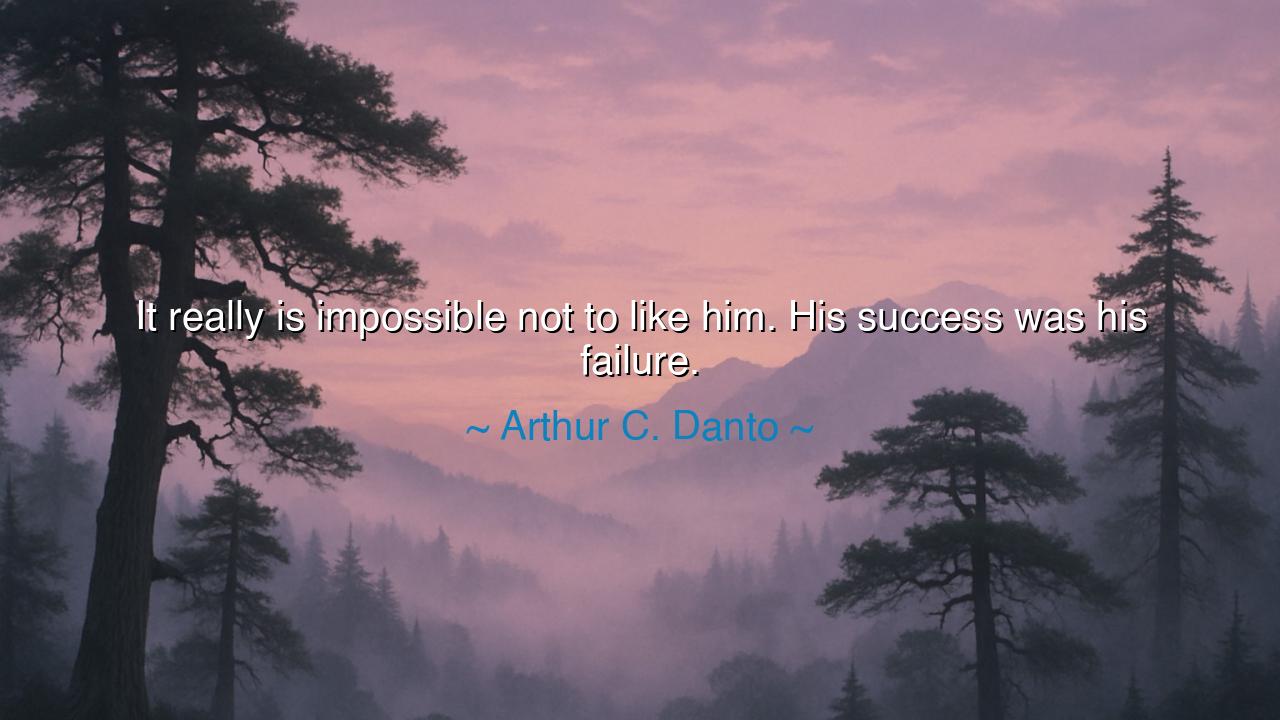
It really is impossible not to like him. His success was his






The gentle murmur of the café filled the air, blending with the rhythmic tapping of rain against the window. Jack sat across from Jeeny, his coffee cup cradled in his hands, staring out at the rain-soaked streets. Jeeny, sitting opposite him, seemed lost in thought, her fingers lightly tracing the rim of her cup.
Host: After a brief pause, Jeeny spoke, her voice thoughtful, with a hint of curiosity.
Jeeny: “I came across a quote by Arthur C. Danto today that made me think. He said, ‘It really is impossible not to like him. His success was his failure.’ What do you think he means by that? Do you think success and failure can sometimes be intertwined in a way that makes them inseparable?”
Jack: He looked up, a slight smile tugging at the corner of his mouth. “I think Danto is pointing to the irony that often exists in life—how what we see as success can sometimes actually reveal deeper failures, or how failure can lead to unforeseen success. It’s a bit like how some people achieve great things but, in doing so, lose something important along the way—whether it’s personal fulfillment, relationships, or their original vision. Sometimes, success can be emptied of meaning because it comes at too great a cost, or because it doesn’t fulfill what they truly wanted.”
Jeeny: “Exactly. It’s like success isn’t always a clean win. Sometimes, achieving what you thought you wanted reveals the cost of that achievement, and you end up realizing it wasn’t worth the price you paid. That’s where the failure comes in—what you gained didn’t bring you the satisfaction or joy you expected, and in that sense, your success becomes intertwined with regret or a sense of loss.”
Host: The rain outside had softened, leaving a quiet stillness between them. Jack shifted slightly, his fingers still resting on his coffee cup as he continued.
Jack: “I think Danto’s comment also suggests that the quality of a person’s success isn’t always defined by the outcome, but by the journey. Sometimes, we focus so much on reaching the top—on achieving what others define as success—that we overlook the personal sacrifices it might take. In the end, what truly matters might be the growth and lessons learned along the way, not just the accolades or achievements themselves.”
Jeeny: “Yes, and I think it’s about the person you become through the process. If success comes at the cost of your integrity, your happiness, or your personal connections, then it’s not really success, is it? Maybe that’s what Danto means—that failure can be hidden within success because the very thing that makes someone admired or liked might also be what led them to lose something valuable. It’s like there’s bittersweetness in achieving the very thing you set out for.”
Host: The conversation seemed to deepen, as they both reflected on the complexity of success and failure. Jack set his coffee cup down gently, his expression softening.
Jack: “Exactly. Sometimes we think of success as this singular goal—if we just achieve this thing, everything will fall into place. But in reality, it’s the complexity of our choices that defines us. Danto is perhaps saying that true success isn’t always about the outward achievements, but about the balance between what we gain and what we lose along the way.”
Jeeny: Her smile was small but filled with understanding. “Yes, and I think that’s why some of the most compelling people are those whose success isn’t perfect or clean-cut. They show us that success, in its truest form, is a journey with both victories and losses, both light and shadow. Sometimes, the way we fail becomes a part of the story of success, making it more meaningful.”
Host: The rain had stopped, leaving a calm stillness in the café. Inside, Jack and Jeeny sat in the realization that success and failure are often not opposites but parts of the same process. Arthur C. Danto’s words remind us that sometimes, the very things that make someone’s achievements admirable are also the things that reveal their deepest failures. It’s not about achieving perfection, but about embracing the complexity of our journey—recognizing that both success and failure shape who we are and how we grow.






AAdministratorAdministrator
Welcome, honored guests. Please leave a comment, we will respond soon